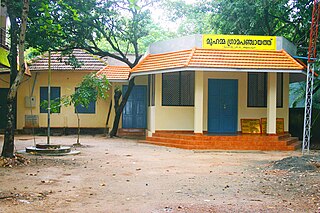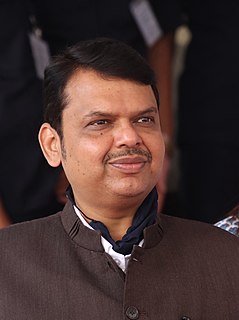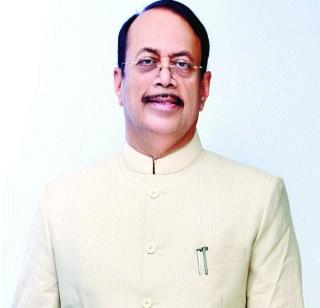
Ahmednagar (or sometimes just called Nagar) is a city in Ahmednagar district in the state of Maharashtra, India, about 120 km northeast of Pune and 114 km from Aurangabad. Ahmednagar takes its name from Ahmad Nizam Shah I, who founded the town in 1494 on the site of a battlefield where he won a battle against superior Bahamani forces. It was close to the site of the village of Bhingar. With the breakup of the Bahmani Sultanate, Ahmad established a new sultanate in Ahmednagar, also known as Nizam Shahi dynasty.

Vilasrao Dagadojirao Deshmukh was an Indian politician who served as the 14th Chief Minister of Maharashtra, first term from 18 October 1999 to 16 January 2003 and second term, from 1 November 2004 to 5 December 2008. He also served in the Union cabinet as the Minister of Science and Technology and Minister of Earth Sciences.
Ralegan Siddhi is a village in Parner taluka of Ahmednagar District, Maharashtra state in western India. It is located at a distance of 87 km from Pune. The village has an area of 982.31 ha (1991). It is considered a model of environmental conservation. The village has carried out programs like tree planting, terracing to reduce soil erosion and digging canals to retain rainwater. For energy, the village uses solar power, biogas and a windmill. The project is heralded as a sustainable model of a village republic.
Karli is a town on the highway between Pune and Mumbai in the Mawal taluka of the Pune district in the southern Maharashtra of India. It is on a major trade route that runs from the Arabian Sea eastward, into the Deccan. Karli's location in Maharashtra places it in a region that is the division between North India and South India. It encompasses an area of 457 ha.
Gram Panchayat is a basic village-governing institute in Indian villages. It is a democratic structure at the grass-roots level in India. It is a political institute, acting as cabinet of the village. The Gram Sabha work as the general body of the Gram Panchayat. The members of the Gram Panchayat are elected by the Gram Sabha.
A sarpanch or Gram Pradhan or Mukhiya is a decision-maker, elected by the village-level constitutional body of local self-government called the Gram Sabha in India. The Sarpanch, together with other elected panchayat members, constitute gram panchayats and zilla panchayats. The sarpanch is the focal point of contact between government officers and the village community and retains power for five years.

Panchayati Raj is the system of local self-government of villages in rural India as opposed to urban and suburban municipalities.
Sudhakarrao Rajusing Naik was an Indian politician from Indian National Congress party who served as Chief Minister of Maharashtra from 25 June 1991 until 22 February 1993 following the communal riots. He had given the new shape to the Panchayat Raj, started the continuous election process in Panchayat Raj systems all over the state. He is called as the hero of Jalkranti, who started the irrigation revolution in the State of Maharashtra.
Eknath Khadse is a politician and leader of the Nationalist Congress Party in Maharashtra state. He was a Member of Legislative Assembly of Maharashtra from Muktainagar constituency for six consecutive terms till 2019. He was a member of the Bharatiya Janata Party from 1987 until his resignation in October 2020.
Maharashtra is a state in the western region of India and is India's third-largest state by area. It has over 112 million inhabitants and its capital, Mumbai, has a population of approximately 18 million. Nagpur is Maharashtra's second, or winter, capital. Government in the state is organized on the parliamentary system. Power is devolved to large city councils, district councils, sub-district (Taluka) councils, and the village parish councils. The politics of the state are dominated by the numerically strong Maratha–Kunbi community. There are national and regional parties in the state, serving different demographics, such as those based on religion, caste, urban and rural residents.

Vijaysinh Shankarao Mohite-Patil is a politician from the Nationalist Congress Party and Member of Parliament (MP) for Madha in Maharashtra since the 2014 general election. He was earlier associated with Nationalist Congress Party. He left NCP on 21 March 2019.
Hiware Korda is a village in Parner taluka in Ahmednagar district of state of Maharashtra, India.
Pimpri Gawali is a village in Parner taluka in Ahmednagar district of the state of Maharashtra, India.
Hiware Bazar is a village in the Ahmednagar District of Maharashtra, India. It is noted for its irrigation system and water conservation program, with which it has fought the drought and drinking water problems.
"Right To Recall (RTR)" are existing laws in some states of India that allow citizens to remove or replace public servants holding posts of Sarpanch, Mukhiya, Corporator and Mayor in the government.
Nikhil Wagle is a journalist from the Indian state of Maharashtra.

Devendra Gangadharrao Fadnavis is an Indian politician who is the current Leader of Opposition in Maharashtra Legislative Assembly. He also served as the 18th Chief Minister of Maharashtra (CM), in office from 31 October 2014 to 12 November 2019. He was the first Chief Minister of Maharashtra from Bharatiya Janata Party (BJP).

Kisan Shankar Kathore is politician from Ambernath, Thane, in Maharashtra state of India. He was Sarpanch of Sagaon Group Gram Panchayat (Tal-Ambernath) between 1978 and 1992. He also worked as President of Thane Zilla Parishad from 2002 to 2004. He moved from Nationalist Congress Party to Bharatiya Janata Party in October 2014.
Smart Village is a concept adopted by national, state and local governments of India, as an initiative focused on holistic rural development, derived from Mahatma Gandhi's vision of Adarsh Gram and Swaraj. Prime Minister Narendra Modi launched Sansad Adarsh Gram Yojana (SAGY) or SAANJHI) on 2 October 2014, Gandhi's birthday, in addition to Smart Cities and Digital India, as a development programme for India. The Parliamentarian's Model Village Scheme main goal is for each Member of Parliament and Minister to adopt a rural village and develop it into a model by 2019 under the SAGY guidelines. The vision of SAGY is an integrated village development plan, encompassing Personal, Human, Social, and Economic dimensions.






